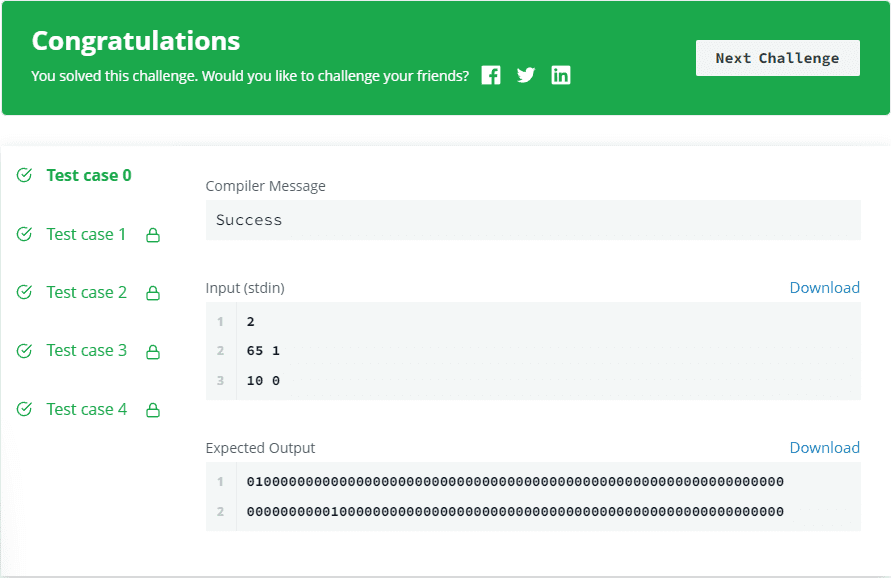C++ Variadics Hackerrank Solution in C++. A template parameter pack is a template parameter that accepts zero or more template arguments (non-types, types, or templates). To read more about the parameter packs, click here.
Create a template function named reversed_binary_value. It must take an arbitrary number of bool values as template parameters. These booleans represent binary digits in reverse order. Your function must return an integer corresponding to the binary value of the digits represented by the booleans. For example, reversed_binary_value<0,0,1>() should return 4.
Input Format
The first line contains an integer, t, the number of test cases. Each of the t subsequent lines contains a test case. A test case is described as 2 space-separated integers, x and y, respectively.
- x is the value to compare against.
- y represents the range to compare: 64*y to 64*y+63.
Constraints
- 0 <= x <= 65535
- 0 <= y <= 1023
- The number of template parameters passed to reversed_binary_value will be <= 16.
Output Format
Each line of output contains 64 binary characters (i.e., 0's and 1's). Each character represents one value in the range. The first character corresponds to the first value in the range. The last character corresponds to the last value in the range. The character is 1 if the value in the range matches X; otherwise, the character is 0.
Sample Input
2
65 1
10 0
Sample Output
0100000000000000000000000000000000000000000000000000000000000000
0000000000100000000000000000000000000000000000000000000000000000
Submit your solution here: Click here
C++ Variadics Hackerrank Solution in C++
#include <iostream>
using namespace std;
// Enter your code for reversed_binary_value < bool...>()
template < bool first, bool...digits >
constexpr int reversed_binary_value()
{
if constexpr(sizeof...(digits) > 0)
return first + reversed_binary_value < digits... > () *2;
else
return first;
}
template < int n, bool...digits >
struct CheckValues
{
static void check(int x, int y)
{
CheckValues < n - 1, 0, digits... >::check(x, y);
CheckValues < n - 1, 1, digits... >::check(x, y);
}
};
template < bool...digits >
struct CheckValues<0, digits... >
{
static void check(int x, int y)
{
int z = reversed_binary_value < digits... > ();
std::cout << (z + 64 *y == x);
}
};
int main()
{
int t;
std::cin >> t;
for (int i = 0; i != t; ++i)
{
int x, y;
cin >> x >> y;
CheckValues<6>::check(x, y);
cout << "\n";
}
}The Output of C++ Variadics Hackerrank Solution
Similar to C++ Variadics
- C++ Class Template Specialization Hackerrank Solution in C++
- Attending Workshops Hackerrank Solution in C++
- Overload Operators Hackerrank Solution in C++
- Abstract Classes - Polymorphism Hackerrank Solution in C++
- Exceptional Server Hackerrank Solution in C++
- Inherited Code Hackerrank Solution in C++
- Box It Hackerrank Solution in C++
- Classes and Objects Hackerrank Solution in C++
- Class Hackerrank Solution in C++
- Virtual Functions Hackerrank Solution in C++
- C++ Class Templates Hackerrank Solution in C++
- Operator Overloading Hackerrank Solution in C++
- Preprocessor Solution Hackerrank Solution in C++









![Structure Program For Student Details in C [Using Structure] Structure Program For Student Details in C [Using Structure]](https://blogger.googleusercontent.com/img/b/R29vZ2xl/AVvXsEia18_2AFR02YTHxDT4P5CZj8CrScKHBklTbxxwUfkG1iMFhISy_4HsJ61VoliPnCxqTZuKz8K4phrELLrPBzg6EI6acbZTi9X--Zo1ZE6Nm8fdcE189o3LZyaJY13K-KDDFpm4XbzJ6rjxZwkplE-KSseoEXHuYpTGZRoyQGtpAdCr1kcEvVoTWP0Y/s72-c/Structure%20Program%20For%20Student%20Details%20in%20C.jpg)




0 Comments: